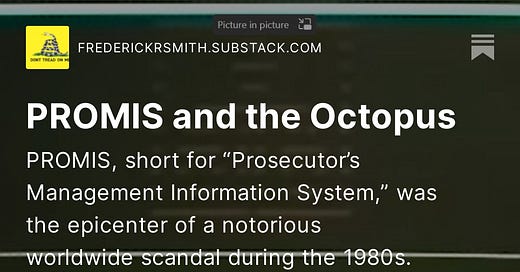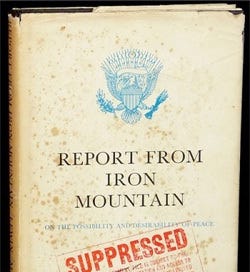
Discover more from Frederick R. Smith Speaks
PROMIS and the Octopus
PROMIS, short for “Prosecutor’s Management Information System,” was the epicenter of a notorious worldwide scandal during the 1980s.
Temporarily, the verdict seems to be that Mr. Casolaro killed himself in a Martinsburg, W.Va., hotel room two weeks ago. No one who knew him accepts that explanation. He was an outgoing, talkative, vital person; he was on top of a major break in a story he had been pursuing for eight years; he was headed for a family party. Everything about the story rings falsely.
James J. Kilpatrick
Executive Summary
PROMIS, short for “Prosecutor’s Management Information System,” was the epicenter of a notorious worldwide scandal during the 1980s. The critical part of the scandal was the PROMIS computer software developed by Inslaw Inc. The program was designed to be used by prosecutors to manage their cases. It was hailed as a revolutionary tool that would help improve the efficiency and effectiveness of the criminal justice system.
PROMIS Overview
The story of PROMIS begins in the 1970s, when a husband and wife team, William and Nancy Hamilton, founded Inslaw Inc. They developed the software, and in 1982, they signed a contract with the United States Department of Justice (DOJ) to provide them with a customized version of the program. However, the relationship between Inslaw and the DOJ soon turned sour, and the Hamiltons accused the government of stealing and using their software without their permission.
Also known as the “Inslaw Affair,” the PROMIS scandal was the subject of multiple investigations, including one by the U.S. House Judiciary Committee. Still, no criminal charges were ever brought against anyone involved. The scandal also led to several conspiracy theories, with some claiming that the software was used for nefarious purposes such as espionage, money laundering, and even arms trafficking.
But the real power of PROMIS is that with a staggering 570,000 lines of computer code, PROMIS can integrate innumerable databases without reprogramming. In essence, PROMIS can turn blind data into information. Information, when wielded with finesse, begets power. Converted for use by intelligence agencies, as has been alleged in interviews by ex-CIA and Israeli Mossad agents, PROMIS can be a powerful tracking device capable of monitoring intelligence operations, agents, and targets instead of legal cases.
Many individuals linked to the PROMIS scandal have died or “went missing” under mysterious or unexplained circumstances. These deaths have led to speculation surrounding the PROMIS software and its alleged involvement in government corruption and illicit activities. The more notable cases include the following individuals.
Danny Casolaro
As a freelance journalist, Casolaro was investigating the PROMIS software and the alleged government corruption surrounding it. In 1991, Casolaro was found dead in a hotel room, with his wrists slashed in a “suicide.” However, many have questioned the official suicide ruling. Casolaro had reportedly told friends and family that he was close to uncovering a critical story related to PROMIS. Many believe he was murdered to prevent him from revealing what he had learned about PROMIS and other cases such as Iran-Contra, October Surprise, and Bank of Credit and Commerce International.
The common thread of corruption through all these scandals is known as the “Octopus.” Undaunted by threats, Casolaro continued his work but told his brother, “if there was an accident and he died, not to believe it.” Preceding his death, Casolaro traveled to Martinsburg, Virginia, for a meeting with sources on Inslaw, whom Casolaro described as a relative of Mrs. Barbara Videnieks, Chief of Staff to Senator Robert Byrd of West Virginia. Peter Videnieks, the husband to Barbara, served as the Justice Department’s Contracting Officer on the PROMIS Implementation Contract.
Vali Delahanty
On August 18, 1992, Vali Delahanty disappeared as she tried to warn Michael Riconosciuto about a plan by the Drug Enforcement Agency (DEA) and Justice Department officials to set him up on a drug charge. The skeletal remains of her body were discovered in a ravine at Lake Bay, Washington, on April 13, 1993. Her disappearance and death prevented her from testifying on behalf of CIA Agent Michael Riconosciuto and against the Justice Department and DEA.
Delahanty’s sister, Debbie Baker, told Rodney Stich that Vali had called her shortly before her disappearance and stated that she had sensitive information concerning the Inslaw matter and the DEA and Justice Department’s attempt to imprison Riconosciuto falsely. Vali reportedly wrote to Riconosciuto that she had data showing that the DEA agent Hurley was working with John Munson to set up Riconosciuo. Vali was an alcoholic and was living with Munson. The evidence indicates that Munson collaborated with DEA and Justice Department personnel to frame Riconosciuto on the sham amphetamine-manufacturing charge. Several months before Vali’s body was found, Munson reportedly told people at a local bar, while he was inebriated, that she “was dead.” Later discovery of her body proved him correct.
Dennis Eisman
Philadelphia attorney Dennis Eisman was found slumped over the wheel of his Porsche in an underground parking lot in the city’s business district. Eisman was killed by a bullet fired into his chest at point-blank range. According to at least one close associate of Eisman, the Philadelphia lawyer was in contact with Casolaro shortly before his death. Eisman had reportedly gone to the Philadelphia parking lot early in the morning of April 23, 1991, to meet with a woman who was to deliver critical evidence substantiating Michael Riconosciuto’s claims about threats from Peter Videnieks. His killers intersected him before he was able to make that rendezvous. According to this account, intermediaries asked Eisman to take up the Riconosciuto case.
Barry Kusnick
Barry Kusnick, a computer engineer who enhanced the PROMIS software, also found himself on “the list.” According to a report, Kusnick developed an advanced program called Brainstorm, which utilized artificial intelligence to analyze individual thought patterns using PROMIS’ predictive capabilities. Brainstorm allowed PROMIS to infer potential actions based on the personality traits of the individuals under surveillance. Like the Inslaw case, Kusnick had undertaken these modifications as part of a government contract, which unfortunately went unpaid. It appeared that the government intended to push Kusnick into bankruptcy. Before this, Kusnick had worked in communications and intelligence for Northrop Corporation and the U.S. military. Despite his disappearance, his body remained unaccounted for, and even after nine months, his family members struggled to find any known business partners who would admit to having any knowledge of him. Eventually, five boxes containing his personal belongings were discovered in a storage facility.
Michael Riconosciuto
As an expert computer programmer, Michael Riconosciuto was crucial in investigating the PROMIS software system and its alleged involvement in government corruption and illicit activities. Riconosciuto was a computer expert and inventor who had reportedly been involved in developing and modifying the PROMIS software. Riconosciuto was arrested in 1991 on suspicious drug charges and sentenced to prison. While in prison, Riconosciuto made several statements and provided information to investigators about his involvement with the PROMIS software and its alleged government corruption.
In 2002, while still in prison, Riconosciuto died under mysterious circumstances. His death was officially ruled as a heart attack, but there have been questions and doubts about the official cause of death and calls for further investigation. Riconosciuto’s family and friends have expressed doubts about the official cause of death and have called for further research into the case.
Peter Sandvigen
Residing on Whidbey Island in Washington, Sandvigen was ready to leave the Navy Air Station on Whidbey Island as part of further investigation into Inslaw. His body was found on December 2, 1992. His gun was found without the ammo clip, raising questions. Sandvigen had been part of a 26-man CIA team in Afghanistan during the late 1980s. He tried to help Riconosciuto defend against the Justice Department’s amphetamine charges and expose the Inslaw scandal.
Gail Spiro
On November 1, 1992, the bodies of Gail Spiro and her three children were found in their Rancho Santa Fe, California, home, dead from gunshot wounds to the head. Three days later, the body of Gail’s husband, Ian Spiro, was found dead in the front seat of his Ford Explorer in the remote California desert. Authorities ruled that Ian Spiro had murdered his wife and children and then had taken his own life. Spiro had connections to the CIA and had been involved in numerous covert operations. At the time of his death, he was helping Michael Riconosciuto collect documents to be presented to a federal grand jury in connection with Inslaw.
Alan D. Standorf
On January 31, 1991, the body of Alan D. Standorf was found in the back seat of a car parked at the Washington National Airport. Standorf was a source of information for Casolaro. Michael Riconosciuto had introduced Danny Casolaro to Standorf. It is believed that Standorf, an electronic intelligence employee for the National Security Agency, was an essential source for some of the information obtained by Danny Casolaro linking the Justice Department to the various parts of the scandals. Casolaro had previously told a friend, Bill Turner, that a critical source of information on the scandals he was investigating had disappeared (referring to Standorf).
Government “Investigation”
William Barr, who served as the United States Attorney General under President George H.W. Bush and again under President Donald Trump, was peripherally involved in PROMIS. That was during his tenure as the head of the Office of Legal Counsel at the Department of Justice (DOJ) in the early 1980s.
Barr awarded a contract to Inslaw Inc. for developing the PROMIS software. He reportedly worked closely with the company’s founders, William and Nancy Hamilton. However, when Inslaw accused the DOJ of stealing and using the software without their permission, Barr became involved in a legal dispute between the two parties. He was involved in the DOJ’s defense against Inslaw’s claims, and he was also involved in the decision to appeal the $6.8 million judgment that had been awarded to Inslaw.
Barr has denied any wrongdoing in the PROMIS scandal and stated that the DOJ acted appropriately in handling the case. However, some have criticized his involvement in the case, arguing that he should have recused himself due to his previous relationship with the Hamiltons and Inslaw. It’s essential to note William Barr never faced charges for any illegal activity related to the PROMIS scandal. Of note, in his book Defrauding America: Encyclopedia of Secret Operations by the CIA, DEA, and Other Covert Agencies, on page 304, Rodney Stich wrote:
Media publicity forced Barr to do something. He appointed a former Justice Department crony to conduct an “investigation” of the Inslaw matter and then report back to him. The special counsel would be selected by Barr; would be subservient to him; and would report to him. Barr could then ignore the recommendations in the remote possibility the special counsel did not cooperate in the expected coverup. Barr hand-picked Chicago attorneys Nicholas Bua a former U.S. District Judge, his law partner, Charles Knight, and five Justic Department prosecutors to investigate the Justice Department’s criminal misconduct. Bua then impaneled a federal grand jury to conduct an “investigation into the Inslaw affair.” Bua’s law partner, attorney Charles Knight, controlled the witnesses and questioning before the grand jury in a manner almost guarantee to avoid a grand jury indictment.
There have been allegations that the Central Intelligence Agency (CIA) was involved in the PROMIS scandal, specifically in the distribution and use of the software. Some have claimed that the CIA used PROMIS to gather intelligence and track individuals, money laundering, and arms trafficking.
One theory is that the CIA obtained a version of the software through a third party and then modified it to include a “backdoor,” allowing them to access the data stored in the program. This theory is based on the claim that the software was handy for tracking individuals and organizations and that the CIA would have had a strong interest in using it for intelligence gathering. Another theory is that the CIA used PROMIS to help track money flows through international bank accounts and identify potential money launderers and other financial criminals.
It’s important to note that there is no concrete evidence that the CIA was directly involved in the PROMIS scandal, and these allegations have never been proven. The CIA denied involvement in the case and stated they had never had the PROMIS software. Nevertheless, Rodney Stich implicated the CIA in his book Defrauding America.
Meanwhile, Sherman Skolnick, the longstanding chairman of Chicago’s Citizen’s Committee to Clean Up the Courts, made alarming allegations about the Inslaw case. He asserted that nearly forty witnesses involved in the case had been killed, expressing his concern that a federal judge assigned to review the matter showed no regard for the safety of other witnesses. Skolnick further disclosed that a Special Federal Grand Jury in Chicago intended to bypass the judge and issue significant indictments independently.
Additionally, Skolnick reported that three witnesses from the grand jury and Riconosciuto took legal action against the judge, accusing him of impeding the indictments. It was revealed that the judge had an FBI agent interrogating witnesses, who himself was under suspicion for the murder of Casolaro. Skolnick brought attention to these troubling developments.
The Inslaw Affair Documentary
In the early 1990s, Australia’s “A Current Affair” news program aired this segment on the INSLAW scandal:
Back to the Future ~ PRISM
PRISM is a controversial surveillance program first revealed by Edward Snowden in 2013. The program, run by the National Security Agency (NSA), allows the agency to collect and analyze data from various internet companies, including Google, Facebook, and Apple. Privacy advocates and civil liberties groups have criticized PRISM for its broad scope and potential to infringe on individual privacy rights.
It is said that the PROMIS software influenced the PRISM program’s functionality and features. However, it is unclear if the PRISM program and PROMIS software are directly related or if PRISM is a continuation of the PROMIS software.
The controversial forerunner of the PRISM program is the “Terrorist Surveillance Program” (TSP), revealed in 2005. The TSP was a warrantless wiretapping program implemented by the National Security Agency (NSA) following the September 11 terrorist attacks in 2001. The program was controversial for its potential to infringe on civil liberties, and in 2007, a federal judge ruled that it was unconstitutional. However, the program continued in some form until it was replaced by the PRISM program in 2007.
Conclusion
The PROMIS scandal was a complex and multi-faceted political scandal in the United States during the 1980s. At the center of the scandal was a computer software program called PROMIS developed by Inlsaw Inc. The founders of Inslaw accused the U.S. Department of Justice of stealing and using their software without their permission, and the case went to court. Despite the accusations, no criminal charges were ever brought against anyone involved in the scandal, and much speculation persists.
This essay scratches the surface of the interlocked PROMIS and BCCI (stay-tuned) scandals. 📕
Sources
The Octopus: Secret Government and the Death of Danny Casolaro ~ Kenn Thoma & Jim Keith (authors), 308 pages, Feral House (publisher), November 2003
Defrauding America: Encyclopedia of Secret Operations by the CIA, DEA, and Other Covert Agencies ~ by Rodney Stich ~ 735 pages, Diablo Western Press ~ April 2001
Seventy Greatest Conspiracies of All Time: History’s Biggest Mysteries, Coverups, and Cabals ~ by Jonathan Vankin, John Whalen ~ 528 pages ~ Citadel (publisher) ~ June 2000
Odor of a Situation Needing a Probe ~ James J. Kilpatrick ~ Baltimore Sun August 29, 1991
Robert Maxwell: Israel’s Superspy (Israel stole the PROMIS software) ~ Anto Necon Report
The INSLAW Octopus - Wired.com
The Inslaw File - Washington Post
It Happened Right Here! Wife of key witness in Justice scandal - INSLAW case - is arrested in Napa ~ Napa Sentinel 1992
Declassified Documents Call Into Question Official Washington Narrative of Danny Casolaro’s Death ~ Covert Action Magazine
String of ‘suicides’ litters the trail of ‘Octopus’ grand conspiracy ~ Execute Intelligence Report
“The Octopus:” INSLAW PROMIS software scandal and those killed by its tentacles ~ The Millennium Report
NSA’s empty PROMISes ~ MuckRock
The Undying Octopus: FBI and the PROMIS affair Part 1 ~ MuckRock
The Undying Octopus: FBI and the PROMIS affair Part 2 ~ MuckRock
The Inslaw Affair ~ Archive of legal documents
Obstruction of Justice: Exposing the Inslaw Scandal and Related Crimes
~ by Karen Bixman ~ Media Bypass Magazine
The Danny Casolaro Primer: 13 reasons to doubt the official narrative surrounding his death ~ MuckRock
INSLAW Briefing Paper ~ Internet Archive
Peter Videnieks Deposition ~ Internet Archive
THE INSLAW AFFAIR SEPTEMBER 10, 1992. - Committed to the Committee of the Whole House on the State of the Union and ordered to be printed ~ hannelingreality.com


















Don't get me started on these windmills. They are hideous! A total ridiculous blight on the land. Often they are broken and hanging there. Or there is no wind.
A lot of conspiracy theories are getting light shed on them. I hope it brings down the CIA/FBI. CIA never paid the price for the BLACK TAR HEROIN SMUGGLING OUT OF LAOS, that got many of our Vietnam troops hooked and killed. Nor do most realize they are still in the DOPE PEDDLING BUSINESS with the Mexican Cartels and probably China. Intractable Pain Patients know more than our dumb politicians and doctors. More Evidence That Opioid Policymakers Keep Aiming at the Wrong Target
By Jeffrey A. Singer https://www.cato.org/blog/more-evidence-opioid-policymakers-keep-aiming-wrong-target